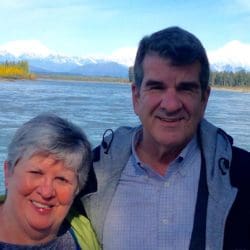I had not been familiar with the term "Military Caregiver" at the time, but I became one in November 2012 when my husband suffered a major stroke.
Has another caregiver been helpful to you? If so, how?
YES, YES, YES! I have a friend who is also a caregiver to a Vietnam veteran, and has her own medical issues like me. She is a great non-judgmental listener and understands exactly what my life is like.
How do you find strength in the difficulty of your day-to-day?
Some days I have to look a little harder and deeper for the strength. I find that keeping a gratitude journal is most helpful. With each entry, I start by writing two things I am grateful for, and when I do that, life seems a little easier. I also have a great support network of family and friends whom are valuable resources.
What do you think is the biggest misconception civilians have about your situation?
I don’t think civilians have any understanding as to what it is like to care for a wounded warrior and the complexity of the issues. It is not something that can be easily explained, so it is often better and easier not to say or explain anything. As a Vietnam veteran, Joe has always been reluctant to discuss anything about his experience during the war or his treatment by civilians once he returned home. It took almost 35 years before he opened up about his service. So many of the issues we are dealing with are not visible. Caring for someone with a very high tolerance for pain, who doesn’t want to be a bother to anyone and who thinks there are too many others with more difficult issues, can be very frustrating.

My Story
When Diane's husband, Joe, was injured in 1970 in Vietnam, he spent over a year in military hospitals recovering from severe shrapnel wounds from his head to his toes. For the next 40 years, his medical issues were episodic due to his injuries and just a part of our lives. In 2012, Joe suffered a bilateral stroke. He suffered memory loss, balance problems, communication difficulties, and emotional issues. Diane became a full-time military caregiver: his advocate, decision-maker, and driver. In the last couple of years, Joe has made tremendous progress and continues to improve. At the same time, his original injuries have worsened and resulted in chronic pain. During this time, they have learned about the benefits of a strong support community.
As a Dole Caregiver Fellow, Diane's emphasis is on sharing her experiences and available resources with other caregivers, especially those caring for pre-9/11 patriots. This community has quietly been taking care of their wounded warriors and is only now finding their voices, discovering the term "military caregiver," and sharing their experiences.








